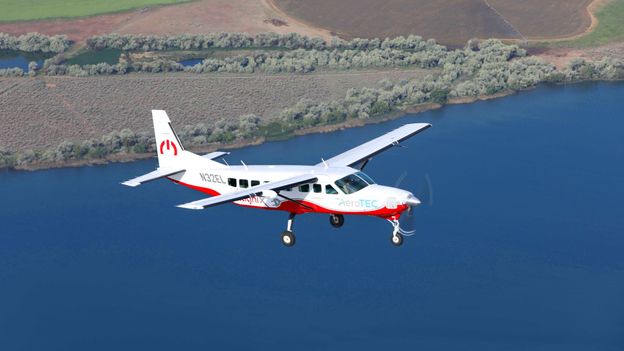
The vast range of projects and experiments in electric aircraft remains encouraging, says Liscouët-Hanke. It means there are more chances for one of these aircraft to succeed. But it’s important not to get sucked into all the hype, adds Richard Aboulafia, vice president of analysis at the aerospace market research firm Teal Group.
While the technological limitations facing larger aircraft are undoubtedly significant, he praises the recent eCaravan experiment. For small planes that carry a handful of passengers or some cargo, there is a small market of about 100 vehicles per year. Electric aircraft of this kind don’t require big shifts in battery technology to work and flights can be trialled over less built-up areas, which ultimately is safer. “That is the ideal test market,” he says.
This won’t excite people who dream of going on holiday in an electric jet (or those living near to busy airports hoping for quieter skies). But it might represent some crucial baby steps on the way to that point.
In the meantime, two other technologies for lowering the emissions of aircraft being considered are biofuels and hydrogen propulsion systems. Each has problems of its own. Biofuels made from organic matter could be used by existing planes and may be greener than kerosene, but as yet the market for it is small and many biofuels come with their own environmental drawbacks.
And hydrogen, while potentially clean if obtained from a renewable source, suffers from some of the same problems as electric batteries. “You need something like three times the volume to store hydrogen for an aircraft than you do for kerosene,” says Thomson. “In today’s architecture for an aircraft, there’s nowhere to put it.”
In other words, all three of these hopeful technologies – batteries, biofuels and hydrogen – require some major breakthroughs before they can revolutionise aviation. And the Covid-19 pandemic, which has hit the airline industry very hard, may hold developments back even further.
Interest in greener travel is building, however. With political support for electrification, the momentum behind experimental projects by Airbus, EasyJet, Rolls-Royce and many others could build, says Liscouët-Hanke.
“If the […] policies are there to support it, I think we will see that,” she says.
For any plane, it does take an awful lot of effort to get off the ground.
--
The emissions from travel it took to report this story were 0kg CO2: the writer interviewed sources remotely. The digital emissions from this story are an estimated 1.2g to 3.6g CO2 per page view. Find out more about how we calculated this figure here.
--
Join one million Future fans by liking us on Facebook, or follow us on Twitter or Instagram.
If you liked this story, sign up for the weekly bbc.com features newsletter, called “The Essential List”. A handpicked selection of stories from BBC Future, Culture, Worklife, and Travel, delivered to your inbox every Friday.
"electric" - Google News
June 18, 2020 at 06:32AM
https://ift.tt/30Ujpta
The largest electric plane ever to fly - BBC News
"electric" - Google News
https://ift.tt/2yk35WT
https://ift.tt/3bbj3jq
No comments:
Post a Comment